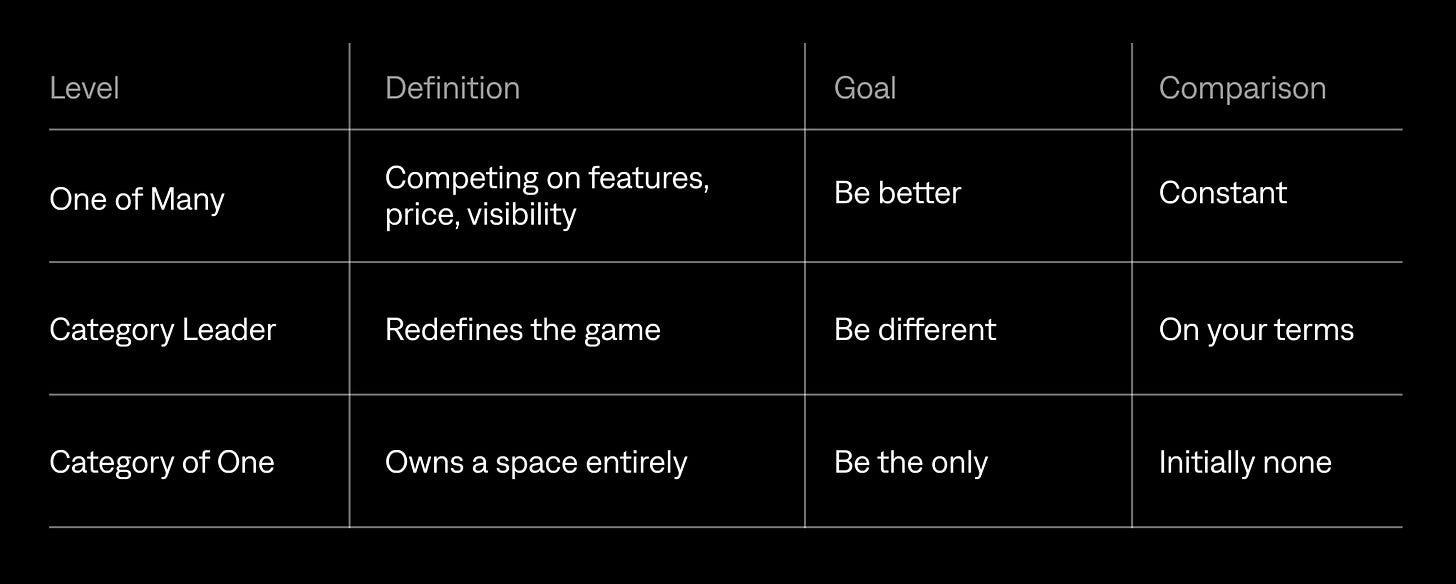The Strategy That Turns Companies Into Cultures
The Most Powerful Position in Business Isn’t #1
A few weeks ago, I asked a dangerous question: What if you stopped competing? Not by being louder, cheaper, or faster, but by refusing to line up at all?
Replies flooded in - excited, skeptical, curious. But most circling the same idea: "OK… but how do you actually do that?"
The Traditional Positioning Ladder
Let’s step back a bit. Most brands exist somewhere on this spectrum:
One of Many is the red ocean - crowded and competitive. You usually don’t want to be here.
Category Leader - means you set the terms of competition. Think Google in search or Spotify in music. They define how we think about their categories.
Category of One - popularised by the book "Play Bigger". It means creating an entirely new category. Powerful but increasingly temporary in today's world where anyone can quickly build and ship alternatives.
The Missing Dimension: Uncomparison
The linear progression of Category Design misses something crucial. Some brands transcend the competitive framework entirely. They achieve something I call Uncomparison - when comparison itself breaks down.
Some may argue that what I'm calling "Uncomparable" is simply a well-executed Category of One strategy. After all, both aim to transcend direct competition. But there are profound differences that make Uncomparison a distinct concept.
The key insight is that Uncomparison exists as a separate layer that can be applied to any competitive position.
You can be:
A Category of One that is also Uncomparable (like early Apple)
A Category Leader that is Uncomparable (like Patagonia in outdoor clothing)
Even a One of Many brand that achieves Uncomparable status (like certain cult indie brands or maybe even Basecamp)
Uncomparable is not a position. It's a perception.
Category Design vs. Uncomparison
Category design is a deliberate strategic methodology to create and dominate new market categories. And this is a quick overview of how Category Design usually looks.
Category design is the strategic process: framing, positioning, messaging.
Uncomparison is what happens when that strategy is executed with soul - creating such profound resonance that comparative analysis becomes irrelevant.
Uncomparison doesn't replace your market position - it transcends it. It's an emotional and cultural dimension that exists independently of where you sit in the competitive landscape. One doesn't replace another; they work on different planes entirely.
The true test is this: If another company enters your category with an objectively "better" product - more features, better performance, lower price, would they steal your customers? For merely Category of One companies, the answer is often yes. For truly Uncomparable brands, the answer is largely no, because the decision to choose them was never primarily about product specifications in the first place.
Category of One vs Uncomparable
Think of it this way: A Category of One is the only taco truck in a town of burger joints. An Uncomparable brand is where people go not for the food, but for how being there makes them feel.
What creates this state?
I’ve been thinking a lot about this. I went through numerous brands and case studies, spoke with various people, and while this is still quite raw, I’ve managed to identify five key characteristics.
Strong Beliefs - standing for something meaningful beyond just making products
Emotional Connection - making people feel seen and understood, not just served
Distinctive Character - having recognisable quirks that would feel wrong if changed
Owning Your Story - refusing to be defined by industry standards or competitors
Prominent Founder/Figure - there’s often a human at the front, with a perspective, presence, and views that makes the whole brand more real and relatable.
Real-World Examples
Category of One:
Figma → Redefined collaborative design
Liquid Death → Turned water into rebellion
Tesla → Positioned EVs as high-performance luxury
Uncomparable:
Apple (early 2000s) → Not "better specs", different values and aesthetics
Patagonia → Not a brand, a movement
Basecamp → Rejected VC funding and hypergrowth when every tech company chased it
The Patagonia Story
Patagonia exemplifies uncomparison through its founder Yvon Chouinard's authentic vision. Chouinard, who lived out of his car for years while climbing, built a company where business and environmental activism are inseparable:
Pledged 10% of profits to environmental causes in 1985, later founding "1% for the Planet"
Transitioned to 100% organic cotton in 1996 despite enormous business risk
Created a culture where employees surf or ski during work hours, resulting in 4% turnover
In 2022, transferred ownership to a trust and nonprofit dedicated to fighting climate change
While competitors sell outdoor gear, Patagonia sells participation in an environmental movement, making traditional product comparisons almost irrelevant to its loyal customers.
The Transformation Process
When you become uncomparable, you undergo this transformation:
Your features still exist, but they're not why people choose you. When a competitor launches a "better" product, it barely matters. The decision happens on different grounds entirely.
The Trade-offs
Becoming uncomparable has costs, and these costs are actually what make many to play the “safer” game.
May alienate potential clients who don't align with your vision
Investors might be wary of principles that limit growth
Often less scalable than conventional strategies
Requires authentic commitment that can't be faked
But uncomparable brands make peace with these limitations because depth of connection matters more than breadth of appeal.
What This Means For You
You don't need to become Apple or Patagonia. But you do need to decide what kind of relationship you want to build - one based on comparison, or one based on resonance.
Smaller companies actually have an advantage: less baggage, fewer stakeholders, more room to move with integrity. When you're close to the ground, it's easier to build something with soul.
Not "how do I stand out?" but "how do I stand alone, truthfully?"
You're no longer fighting to be louder. Or cheaper. Or more polished. You're not chasing. You're choosing. And in doing so, you become chosen.
Hope this made you think.
- Stef






